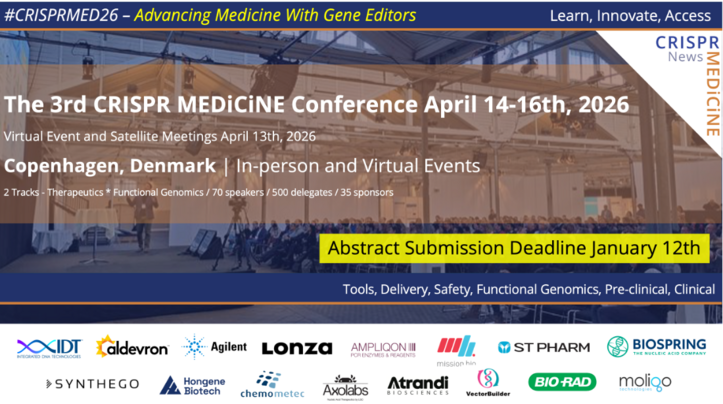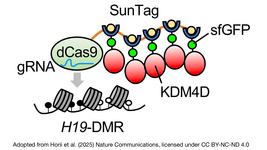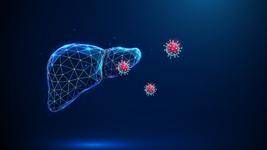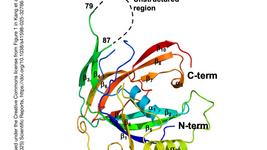CMN Weekly (3 March 2023) - Your Weekly CRISPR Medicine News
By: Karen O'Hanlon Cohrt - Mar. 3, 2023
Top picks
Beyond CRISPR babies: How human genome editing is moving on after scandal. The Third International Summit on Human Genome Editing will be held in London next week. At the event, researchers are expected to discuss advances in genome-editing technologies and the ethics of deploying them. This Nature News piece looks at what has happened since the last of these summits in 2018, which convened one day after biophysicist He Jiankui announced that he had edited the genomes of three embryos that developed into living babies.
Industry
- Yesterday, Intellia Therapeutics announced that the FDA has cleared the company's Investigational New Drug application for NTLA-2002, a single-dose in vivo CRISPR-based investigational therapy for the treatment of hereditary angioedema. This allows the company to include the United States in the global Phase 2 portion of its ongoing Phase 1/2 study for NTLA-2002, which is currently being conducted at sites in the UK, Netherlands and New Zealand. You can read more about the mechanism of action of NTLA-2002 in a previous clinical trial update here.
- Allogene Therapeutics announced this week the publication of an industry-advancing case study on chromosomal rearrangement in Molecular Therapy. The article reviews an investigation concerning a chromosomal rearrangement observed in a single patient receiving the company's gene-edited allogeneic CAR T-cell treatment ALLO-501A for barge B cell lymphoma. The results reinforce previous findings that the rearrangement was unrelated to cell manufacturing or gene editing, and not associated with clinical significance.
- Verve Therapeutics provided an update this week on pipeline progress and as well as fourth quarter and full year 2022 financial results. Verve is currently sponsoring the heart-1 clinical trial of its in vivo base-editing candidate for familial hypercholesterolemia, and clinical data from dose escalation cohorts are expected in the second half of 2023.
- Beam Therapeutics reports fourth quarter and year-end 2022 financial results and reiterates anticipated milestones, including continue enrolment in the sentinel cohort of its BEACON Phase 1/2 clinical trial evaluating BEAM-101 as a treatment for sickle cell disease, and enrolment and dosing of the first patient in a Phase 1/2 clinical trial of BEAM-201 in patients with relapsed/refractory T-cell acute lymphoblastic leukemia by mid-2023.
- Allogene Therapeutics reports fourth quarter and full year 2022 financial results and provides business update. The update covers several of the company's TALEN-edited allogeneic CAR-T cell candidates with promising initial clinical results in blood and solid cancers.
- Fate Therapeutics reports fourth quarter and full year 2022 financial results and business updates. Among the updates was the news that the company is planned a mid-2023 Investigational New Drug its gene-edited natural killer cell candidate FT522 NK in B-cell Lymphoma. The company is also planning a 2023 IND submission for its CAR-T cell candidate FT825/ONO-8250 for the treatment of HER2-positive solid tumours.
- Avance Biosciences announced yesterday that it has licensed the next-generation sequencing-based gene-editing off-target analysis technology, GUIDE-seq from SeQure Dx. GUIDE-seq, originally developed by Keith Joung's group at Massachusetts General Hospital and exclusively licensed by SeQure, is designed to assess the efficacy of genome-editing tools such as CRISPR-Cas9
- ImmunoGen announced this week that it has entered into a global, multi-target license and option agreement with Vertex Pharmaceuticals, that will see Vertex gain access to ImmunoGen's antibody-drug conjugate technology for the development of novel targeted conditioning agents for use with gene-editing therapies.
Research and reviews
- A research team in China report the development of dual reactive oxygen species- and pH-responsive core-shell tecto dendrimers loaded with gold nanoparticles (Au CSTDs) to deliver CRISPR-Cas9 reagents for the permanent disruption of the programmed death ligand 1 (PD-L1) gene in cancer cells to boost cancer immunotherapy. The team found upon in vivo delivery in a mouse melanoma model that the novel gene-editing complexes could specifically accumulate at the tumour site for enhanced computed tomography imaging of tumours, owing to the X-ray attenuation effect of Au, and could disrupt PD-L1 expression in tumour cells, thus promoting anti-tumour immunity. The findings were published this week in ACS Applied Materials & Interfaces.
- Delivery challenges for CRISPR-Cas9 genome editing for Duchenne muscular dystrophy. This review summarises the progress in CRISPR gene editing for Duchenne muscular dystrophy including key summaries of current approaches, delivery methodologies, and the challenges that gene editing still faces as well as prospective solutions.
- Correcting inborn errors of immunity: From viral mediated gene addition to gene editing. In this review, authors in Italy analyse the current state-of-the art of conventional gene therapy and innovative protocols of genome editing in various primary immunodeficiencies, describing pre-clinical models and clinical data obtained from different trials, highlighting potential advantages and limits of gene correction.
- Systems Medicine for Precise Targeting of Glioblastoma Systems Medicine Against Glioblastoma. This review presents an overview of various therapies for glioblastoma (GBM), including gene therapeutics based on CRISPR-Cas editing, microRNAs, implanted synthetic cells endowed with synthetic circuits against GBM with neural stem cells, and mesenchymal stem cells acting as potential vehicles carrying therapeutics via the intranasal route, thus avoiding the risks of invasive methods in order to reach the GBM cells in the brain.
- Viral vectors and extracellular vesicles: innate delivery systems utilized in CRISPR/Cas-mediated cancer therapy. This review includes a discussion of the advantages and limitations of viral vectors and extracellular vesicles in delivering CRISPR-Cas gene-editing reagents for cancer therapy purposes.
- Epigenetic regulation in metabolic diseases: mechanisms and advances in clinical study. In this review, authors in China provide a brief timeline of events within epigenetics since the term first emerged. They also summarise research methods used to study epigenetics and introduce four main general mechanisms of epigenetic modulation. Epigenetic mechanisms underlying metabolic diseases and the interaction between epigenetics and genetic or non-genetic factors, are also discussed. Finally, the authors present an overview of clinical trials and applications of epigenetics in metabolic diseases.
Podcasts
- The next CRISPR fight, cheaper insulin, & an FDA shuffle. This episode of The Readout LOUD biotech podcast from STAT, discusses how the latest CRISPR breakthrough is shaping up to be a free-for-all among a multitude of companies and labs, including some of the biggest names in biotech.
News from CRISPR Medicine News
- For this week's clinical trial update, wesummarisd the two ongoing gene-editing clinical trials for renal cell carcinoma, which is the most common form of kidney cancer found in adults. You can read the update here.
To get more of the CRISPR Medicine News delivered to your inbox, sign up to the free weekly CMN Newsletter here.
Tags
CLINICAL TRIALS
IND Enabling
Phase I
Phase II
Phase III
Gastric Cancer and Colorectal Cancer, CRC, (NCT07166263)
Sponsors:
Base Therapeutics (Shanghai) Co., Ltd.
Sponsors:
Base Therapeutics (Shanghai) Co., Ltd.
IND Enabling
Phase I
Phase II
Phase III
Relapsed or Refractory Acute Myeloid Leukemia, AML, (NCT06541444)
Sponsors:
Base Therapeutics (Shanghai) Co., Ltd.
Sponsors:
Base Therapeutics (Shanghai) Co., Ltd.
IND Enabling
Phase I
Phase II
Phase III







